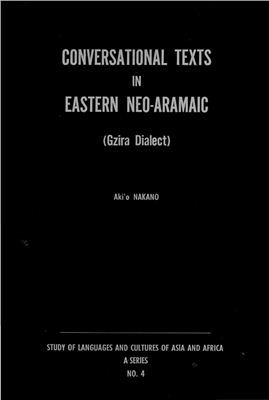Издатель: Institute for the Study of Languages and Cultures of Asia
and Africa
Год издания: 1973
Количество страниц: 60
Язык: English
The aim of this paper is to present one of Easte Neo-Aramaic dialects in the cOllyersational style. Gzira dialect of Neo-Aramaic was spoken by Jewish people in Gzira (Turkish: Cizre). a small town in the south-easte part of Turkey. It is most likely that this dialect is no longer spoken in this district, since it's speakers left Turkey for Syria, Irak or America in the nineteen twenties. At the period of Palestine 'Var, most of those staying in Syria or Irak immigrated to Israel. Consequently, nowadays in Israel, this dialect is spoken by these immigrants and their descendants at their homes, among the relatives and among the friends who came up (rom Gzira. Any speakers of this dialect never 'write this dialect in written form, so this dialect is purely an oral (spoken) language. And all of them are also multilinguals: they speak Hebrew, Arabic (Palestine, Syriac or Iraki Arabic), Kurdic anel / or Turkish. The informant of all these texts is !\tIr. Zion ben-Shmuel (in Aramaic pronunciation [sljon ben Jamu·?el]), bo in Jerusalem in the year 1937_ He is a bilingual of Neo-Aramaic (Gzira dialect) and Mode Hebrew (Israeli-Sphardic)_ He speaks also English and everyday Japanese. His father, llmv deceased, came from Gzira (Cizre) and spoke Aramaic, Arabic and Hebrew. His mother came from Urfa, a city in southe district of Turkey, and speaks the same languages as her husband. So 1\Ir. Zion ben-Shmuel speaks Aramaic with his mother. his next younger brother, adult cousins and some neighbours from the same region. The texts are principally composed of the questions of Nakano (marked as N.) on the everyday life of Jewish people in Israel and of the informations (rom ~IL Zion ben-Shmuel (marked as Z.). The "'hole materials were recorded with a tape-recorder in October, 1970, in Kamakura, Japan and afterwards transcribed phonemicallyS) with the informant's checking. Needless to say that the utterances of the reporter (Nakano) are of no value as linguistic material and should be
understood only as an inducement for the informant to talk with the reporter in Aramaic.
Год издания: 1973
Количество страниц: 60
Язык: English
The aim of this paper is to present one of Easte Neo-Aramaic dialects in the cOllyersational style. Gzira dialect of Neo-Aramaic was spoken by Jewish people in Gzira (Turkish: Cizre). a small town in the south-easte part of Turkey. It is most likely that this dialect is no longer spoken in this district, since it's speakers left Turkey for Syria, Irak or America in the nineteen twenties. At the period of Palestine 'Var, most of those staying in Syria or Irak immigrated to Israel. Consequently, nowadays in Israel, this dialect is spoken by these immigrants and their descendants at their homes, among the relatives and among the friends who came up (rom Gzira. Any speakers of this dialect never 'write this dialect in written form, so this dialect is purely an oral (spoken) language. And all of them are also multilinguals: they speak Hebrew, Arabic (Palestine, Syriac or Iraki Arabic), Kurdic anel / or Turkish. The informant of all these texts is !\tIr. Zion ben-Shmuel (in Aramaic pronunciation [sljon ben Jamu·?el]), bo in Jerusalem in the year 1937_ He is a bilingual of Neo-Aramaic (Gzira dialect) and Mode Hebrew (Israeli-Sphardic)_ He speaks also English and everyday Japanese. His father, llmv deceased, came from Gzira (Cizre) and spoke Aramaic, Arabic and Hebrew. His mother came from Urfa, a city in southe district of Turkey, and speaks the same languages as her husband. So 1\Ir. Zion ben-Shmuel speaks Aramaic with his mother. his next younger brother, adult cousins and some neighbours from the same region. The texts are principally composed of the questions of Nakano (marked as N.) on the everyday life of Jewish people in Israel and of the informations (rom ~IL Zion ben-Shmuel (marked as Z.). The "'hole materials were recorded with a tape-recorder in October, 1970, in Kamakura, Japan and afterwards transcribed phonemicallyS) with the informant's checking. Needless to say that the utterances of the reporter (Nakano) are of no value as linguistic material and should be
understood only as an inducement for the informant to talk with the reporter in Aramaic.

